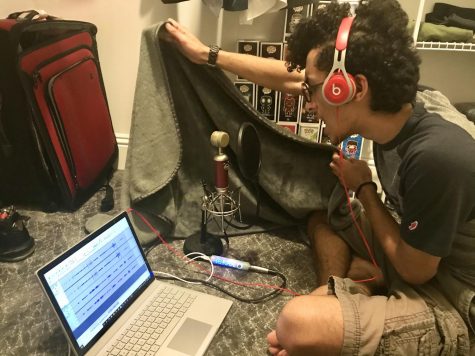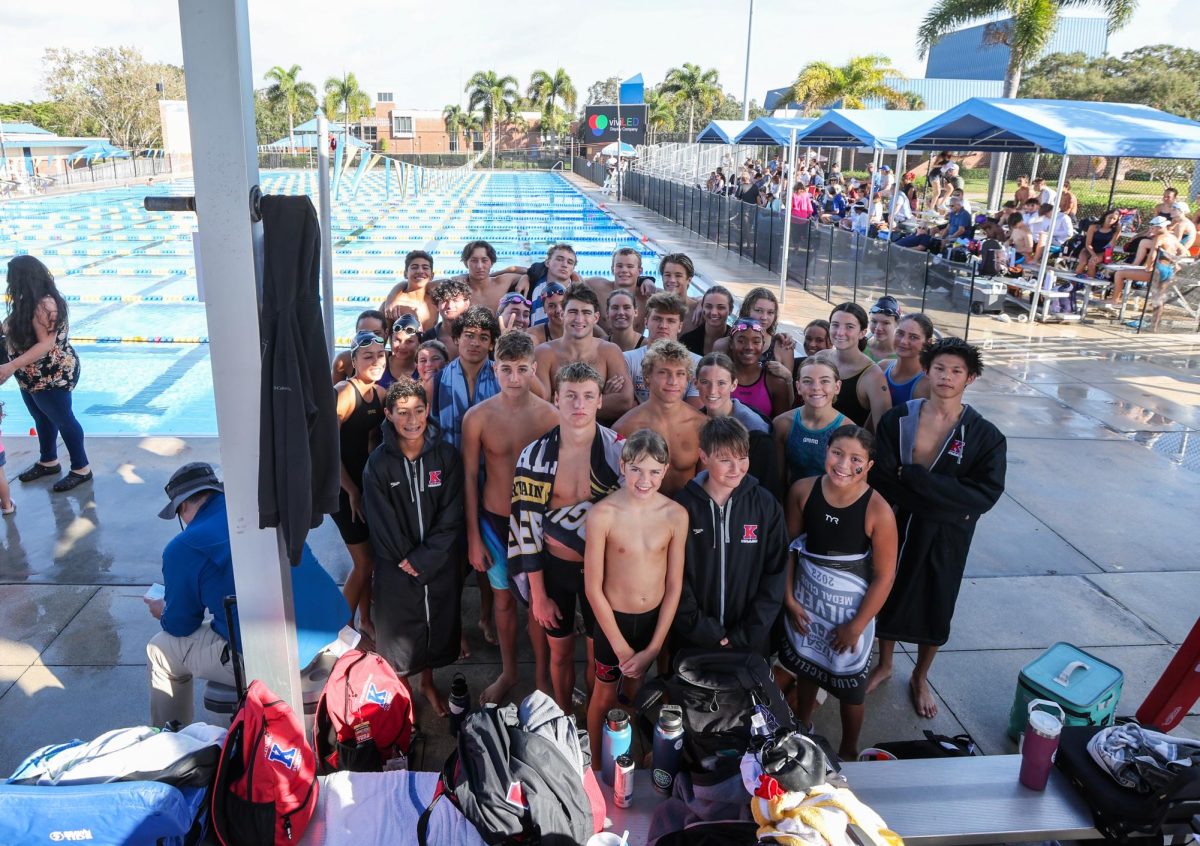“Hi, my name is Logan Weisberg and I make podcasts.”
If you read that in the bio of a dating profile, you probably wouldn’t be too inclined to swipe right. That’s why, if you ever meet me in real life, you will sooner learn of my more glamorous or romantic hobbies, such as filmmaking, writing, and playing the guitar. However, you would be missing out on a significant part of me that I have been working on for several years. Podcasting.
In my head, I actually prefer the term ‘sonic filmmaking’ (and I’m not referring to the Jim Carey CGI monstrosity that came out last year). You see, Podcasts are when you record your group of friends on a voice call and pretend other people think you’re funny. That doesn’t exactly describe what I do. Simply put, I create scripted fiction podcasts. Like TV shows or movies, but just sound. Sonic Filmmaking, if you will.
I got into fiction podcasts a little over three years ago. Back then, I didn’t have any streaming subscriptions and my DVR was always full of BattleBots reruns, so my only real opportunity to listen to serialized fiction was through podcasts. I eventually found some really great fiction podcasts that remain some of my favorites dozens of podcasts later. These included The Bright Sessions and Homecoming. At the same time, one of my younger sisters was getting really into another podcast, which was geared towards a younger audience. After checking it out, I informed her that it was very poorly made and quite boring (Big Brother Moment™). To prove my point, I told her that I could make a better one on my own, despite having no resources or previous experience in the field.
And thus my first podcast was born. It was called Spellbound, and it was the fantasy story of a teenage wizard who had her memories erased and was placed in a new life in the “regular world”. Pretty cheesy, but you can fight me because I’m still proud of it. Making this podcast was a lot of work. I wrote a dozen episodes, casted friends and family, recorded lines, edited them in audio software, and then mashed everything together for the finished product. When I played the first episode for my younger sister, she conceded, admitting that I had created a better podcast than the one she had previously been enjoying. I have made two podcasts since then, and am currently working on the fourth, which is extra special (more on that later).
As I have stated before, podcasting is not a glamorous hobby. At least not for me, a high schooler operating with limited resources and no additional help beyond actors. Every show I create requires 100% of my effort. Literal blood, sweat, and tears. And a few all-nighters.
The first step in creating a podcast is writing. This is the area in which I have the most experience, and yet it is also the area that gives me some of the most grief. Just like in film, a page of the script roughly equals one minute of the show, or in this case, one minute of sound. The average episode in a multi-episode podcast is fifteen minutes. On average, it takes me about four consecutive hours per episode, not counting revisions and later edits. This has varied between the different podcasts I have written.
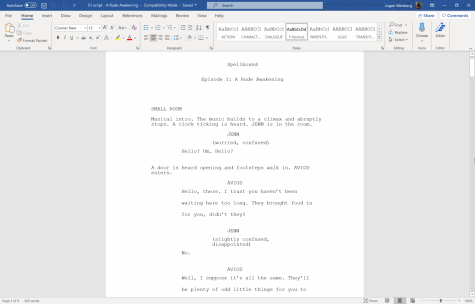
The next step is casting actors. For the first three podcasts I wrote, I reached out to friends and family to voice the parts. In all my podcasts, I have also played a character. After the parts are casted, I send out scripts to all the actors to record and send to me, or I will record with them in-person on my mic setup. Over the years, I have upgraded my equipment from my computer mic to the starter Blue Yeti Bluetooth mic (a controversial pick in the microphone community), to what I have now: the Blue Spark SL Large-Diaphragm Studio Condenser Microphone. Learning my way around microphones and phantom power converters (the middlemen between high-quality mics and the computers the receive the data) was one of the hardest parts in learning to create podcasts, but it was an essential key to improvement.
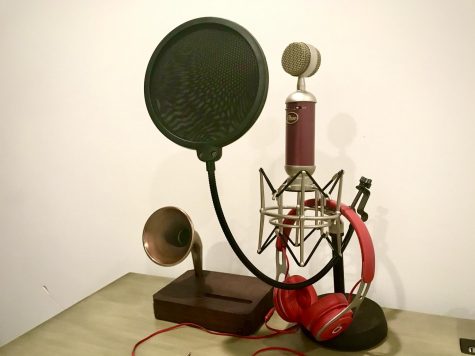
Once I have all the lines from the actors, I edit the audio to make sure everything is equalized and has no background noises. Then I drop everything into Audacity, the audio editing software I use. This includes the lines, sound effects, and music. Depending on the complexity of the soundscape I am trying to create, this may take upwards of five hours per minute of audio. Finally, I upload everything to whatever platform I am using. Originally, I used Soundcloud, but I am transitioning to other platforms like Spotify and Apple Podcasts.
Now, earlier in this article, I had mentioned a fourth, extra special podcast that I am working on. This is a huge project for me–much bigger than anything I have done before. At the end of my Junior year, I released the trailer for my third podcast, Trevor’s Life. Not long after, I was contacted by the owner of several popular web stations, inquiring if I would like to air my show on his stations. While I was thrilled at the opportunity, the podcast I was working on was a miniseries of three episodes, and it wouldn’t be a good fit for radio (strict time frames, ad breaks, etc.). Instead of letting the opportunity go, however, I promised to create a new podcast with the intention of airing it on live radio. This would dictate how I constructed each episode and the series as a whole. I wrote all ten episodes in a single week. Then, as I began to get into casting, the Coronavirus arrived in America, and the country went into quarantine. While this was a terrible thing, it did present me with a unique opportunity. I reached out to actors in New York and Los Angeles that would otherwise have been unavailable and casted them in the project, entitled The Belling Program.
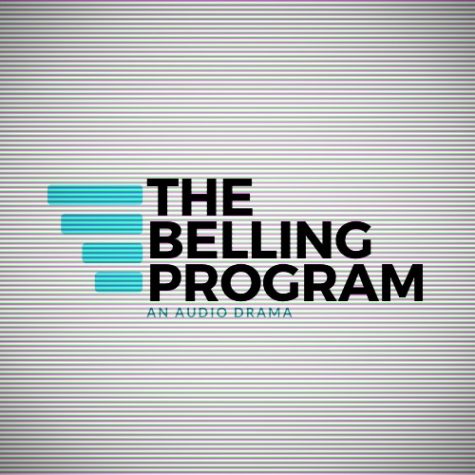
I have been working on The Belling Program for almost a year now, and I am so excited to eventually release the project this Summer. Overall, my work in sonic filmmaking has helped me in many areas of my life. Through it, I have continued to build skills in writing and leadership, as well as learn new skills such as sound mixing and casting. The fact that I have done this work on my own outside of school has also made me stand out in the college admissions process.
To anyone that has a hobby that may not be well-known, respected, or glamorous–my advice to you would be to pursue it. It may be hard at first. There may be a steep learning curve and progress may seem slow. It might also be uncomfortable. You may find yourself stooped over in your closet, yelling into a microphone. But in the wise words of Shia LaBeouf, just do it. You never know where your passions may take you, and at the very least, you will become a more well-rounded person. You may even change the world. Just maybe.
